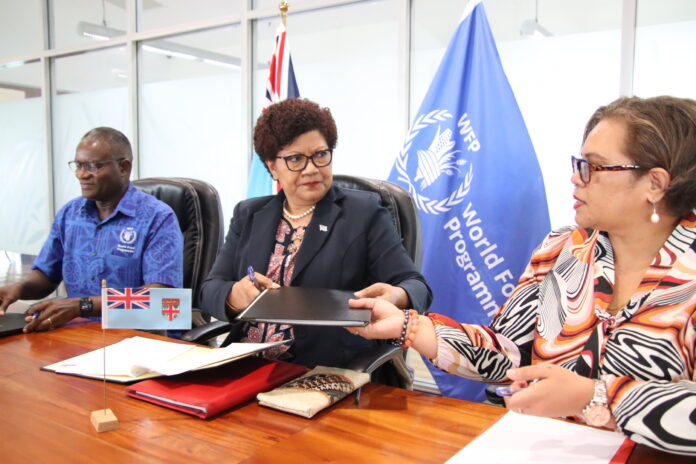Cabinet has agreed that Fiji will pilot the Project for Anticipatory Action for Tropical Cyclones funded under the Central Emergency Response Funds (CERF).
This afternoon, the Ministry of Finance together with the Ministry of Social Protection and the World Food Bank signed the Memorandum of Understanding that will coordinate the pilot project with the World Food Programme and other relevant UN agencies.
Anticipatory Action (AA) refers to actions triggered before a crisis to mitigate the worst effects of the crisis, or even avoid the crisis altogether.
AA is a new global concept used in humanitarian aid, climate change, disaster, and climate finance.
Fiji is the first country in the Pacific to pilot AA related to tropical cyclones.
AA builds on existing Disaster Risk Reduction (DRR) frameworks that enable actions and financing to be triggered on forecast of impending hazard rather than reacting to its impact.
The UN Office for the Coordination of Humanitarian Affairs (OCHA) Centre for Humanitarian Data has been working closely with NDMO and Fiji Meteorological Services (FMS) to design the triggers.
The AA project will be triggered by a tropical cyclone that is forecasted by Regional Specialised Meteorological Centre (RSMC) Nadi to be a:
- Category 4 or 5 while within 250 km of Fiji (The Category in the Australian scale, corresponding to 10-minute sustained wind speeds of >107 knots for Cat 5, 86–107 knots for Cat 4, and 64–85 knots for Cat 3), or
- Category 3, 4, or 5 while making landfall in Fiji.
Each time RSMC Nadi produces a tropical cyclone track forecast, it will be evaluated to determine whether the trigger conditions have been met.
The framework follows two-stage trigger activation, each part of which is triggered based on the lead time of the points in the forecast:
(i) Readiness trigger: If any point in the 120-hour forecast meets the trigger conditions, the readiness trigger is met; and
(ii) Action trigger: If any point in the forecast up to a lead time of 72 hours meets the trigger conditions, the activation trigger is met.
Upon readiness triggers, CERF funds will be immediately disbursed to UN agencies, which can only spend up to 15% of the allocation. The rest can be spent once the activation trigger is activated.
UN agencies involved in the pilot project include the World Food Programme (WFP), Food and Agriculture (FAO), United Nations International Children’s Emergency Fund (UNICEF), United Nations Population Fund (UNFPA), UN Women, and International Organisation for Migration (IOM).





